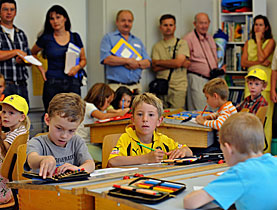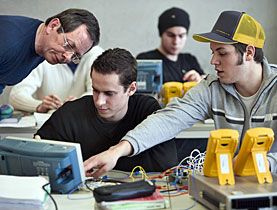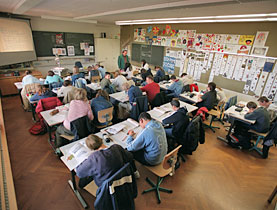Debate simmers over school funding

As Swiss children go back to their classrooms, politicians and interest groups are sharpening their pencils in the debate about public funding for private schools.
Several initiatives have been lodged in German-speaking cantons seeking a public vote on the free choice for parents between public and private schools.
Under the current system public school places are fixed according to the locality where the family lives. Parents who wish to have their offspring educated in a private school have to pay for the privilege.
Lobby Parents Suisse – a group founded by parents with children in schools outside the state system – is campaigning for change on a canton-by-canton basis.
Although a new harmonisation agreement is in the pipeline, each of the country’s 26 cantons is still responsible for the running of its own education system.
Citizens of Basel-Country will provide the litmus test when they vote first on the issue next month. They have to decide if the public purse should cough up SFr15,000 ($13,697) per year for pupils who receive a private education. This is the average cost per head in state schools.
Diversity
“We want to be able to choose between the different school establishments run by the state as well as those run privately. This is on condition that those schools are open to everyone without discrimination,” Susanne Bergius of Lobby Parents Suisse told swissinfo.
The group has about 1,500 members, particularly in German-speaking regions, where alternative educational models such as Montessori and Steiner are better established. Its credo is pedagogical diversity and social justice, Bergius said.
She points out that only non-profit schools are included in these proposals. The group believes it is unfair for parents, who already subsidise the state education system through their taxes, to have to pay out a second time if they want to choose a private school for their children.
In Switzerland, only five per cent of pupils – 80,000 children – attend private schools. But demand is growing, according to the Swiss Federation of Private Schools.
Markus Fischer, secretary general of the federation, sees positive consequences in the adoption of free choice. Such a system would stimulate competition and therefore, according to Fischer, improve the quality of teaching.
Battle lines
On a political level, the debate has become more complex. The centre-right Christian Democrats recently stated its strong commitment to maintaining the public system. But within the ranks some voices are emerging in favour of free choice between public schools or calling for pilot studies.
This can also be interpreted as a hidden immigration issue as some Swiss parents attempt to avoid schools with a high proportion of immigrants who have to learn a national language through immersion in the classroom.
The centre-right Radical Party believes that clear conditions should be laid down for the subsidising of private schools, while the rightwing Swiss People’s Party is more occupied with its battle against the incoming harmonisation programme.
With many vocal detractors of the public school system, the People’s Party will address the issue of freedom of choice at party meeting this weekend.
The centre-left Social Democrats are categorically opposed to free choice in education. The party sees free choice as a hidden subsidy of private schools on the back of the public system.
Social mixing
“We are in favour of the best possible cooperation between public and private,” Georges Pasquier, president of the French-speaking teachers’ union told swissinfo. “But free choice entails too great a cost, as several studies have shown.”
Apart from the question of funding, Pasquier is also concerned about the role schools play in integration.
“To educate a citizen, we have to make the most of the childhood years to mix children without distinction of social or ethnic background. Free choice inevitably leads to ghettos.”
Lobby Parents Suisse flatly refutes this argument. “Today, only a well-off family can take their child out of school. Why should one have to keep one’s children in a school that is not functioning?”
“And why is it that only children from less-advantaged backgrounds have to stay there? Is it up to them to maintain a social link when the others have left?,” Bergius asks.
Free choice poses no threat whatsoever to state schools, according to Bergius. “In countries where it exists, between 80 and 95 per cent of parents choose the schools nearest to where they live. If the state school is good, the pupils stay there.”
In previous votes on the question of state funding for private schools, the electorate has not been convinced of the need for change. In 1983 and 2001, cantons Bern and Ticino both rejected proposals for state aid for parents who opted for private schools.
swissinfo, based on an article in French by Carole Wälti
The start of the new school year is staggered across the cantons from August 11 to September 1. Most classrooms have already re-opened.
Switzerland has no minister for education. Instead the cantons manage their own educational systems with coordination at national level through the organisation representing the cantonal directors of education.
The cantons and communes finance more than 85 per cent of educational expenses.
In Switzerland 95 per cent of children complete their compulsory education at their local public school.
Accepted unanimously by the organisation representing the cantonal directors of education, the new harmonisation agreement, known as HarmoS, replaces the one in force since 1970.
The goal of HarmoS is to harmonise the parameters for compulsory schooling in Switzerland.
The starting age for compulsory schooling will be reduced from six to four.
Every school will be obliged to offer extra care options to families outside the traditional school day, such as school meals or supervised homework.
School lessons will be organised according to timetables, at least in the morning.
The teaching of foreign languages will be harmonised and it will not be obligatory to begin with one of the other national languages.
The Swiss People’s Party has initiated public votes on the acceptance of HarmoS in several cantons.

In compliance with the JTI standards
More: SWI swissinfo.ch certified by the Journalism Trust Initiative











You can find an overview of ongoing debates with our journalists here . Please join us!
If you want to start a conversation about a topic raised in this article or want to report factual errors, email us at english@swissinfo.ch.